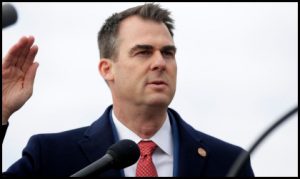The majority of the casino-operating tribes in Oklahoma are reportedly united in their antagonism towards a recent call from the state’s new Republican governor that they should be asked to pay a higher range of exclusivity fees.
Compact commotion:
According to a Tuesday report from the Tulsa World newspaper, Governor Kevin Stitt (pictured), used a July 8 opinion piece to announce that he will be seeking to renegotiate the tribes’ expiring 15-year gaming compacts so that the state gains a bigger piece of the estimated $2.3 billion their casinos earn every year.
Cohesive concern:
However, this plan immediately drew opposition from some of the largest tribes in Oklahoma while the Chairman for the Oklahoma Indian Gaming Association, Matt Morgan, reportedly told the newspaper that his group will be sending a letter to Stitt reiterating its hostility towards the imposition of any higher taxes. He explained that the language in this correspondence was agreed following a recent closed-door meeting attended by representatives from 23 of the state’s 38 federally-recognized tribes before being previewed to some 50 local industry figures at a Monday event in Tulsa.
Morgan told the newspaper…
“We intend to uphold our part of the compact and we hope he will as well. Every tribe has different interests. To see everyone come together as one was pretty powerful. If we stand together, we have a good chance at being in the position we want to be in.”
Gaming profusion:
Oklahoma is home to approximately 120 gambling establishments operated by some 35 tribes under 15-year gaming compacts that are due to expire in January. These enterprises range in size from a few machines placed inside small gas station annexes to large resort-style casino hotels such as the Downstream Casino Resort located near the state’s borders with neighboring Missouri and Kansas.
However, this over-abundance has reportedly not led to a tax windfall as ‘The Sooner State’ collected only approximately $139 million in exclusivity taxes last year, which are a feature of the compacts and forbid the state from legalizing non-tribal gaming in exchange for receiving between 4% and 10% of an aboriginal venue’s gambling revenues.
Rolling relationship:
The Tulsa World reported that 46-year-old Stitt had earlier asserted that these compacts must be renegotiated before January in order to stop the state’s tribes from losing their ability to operate slots or profitable card games such as poker and blackjack. But, Morgan purportedly disagreed and proclaimed that the ‘evergreen’ nature of the deals mean that they will simply be rolled over should no new terms be agreed.
Morgan reportedly told the Tulsa World…
“We believe Governor Stitt has been misinformed about how these compacts work. We believe this is a correct fee structure. Either it’s the same deal or he wants to offer a better deal to the tribes.”
Profitable possibilities:
Nevertheless, Morgan proclaimed that he was giving Stitt ‘the benefit of the doubt’ when it came to his position on the compacts and would be willing to join negotiations regarding an expansion in the types of games the tribal casinos may offer. He purportedly detailed that this could encompass the premiere of sportsbetting alongside more sophisticated slots or true table games and would result in the state earning more cash while maintaining the existing deals.



